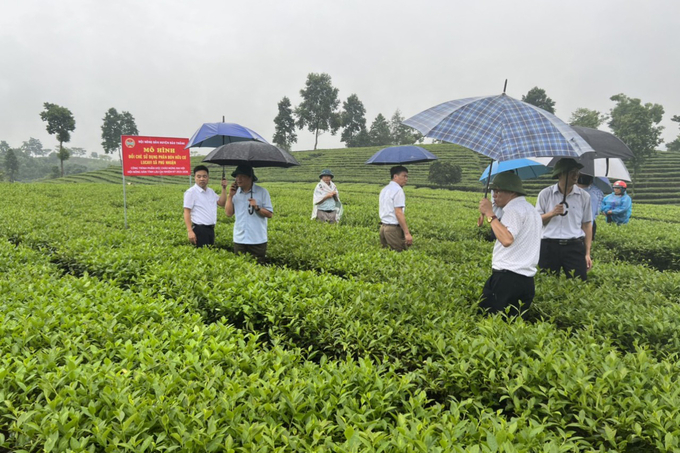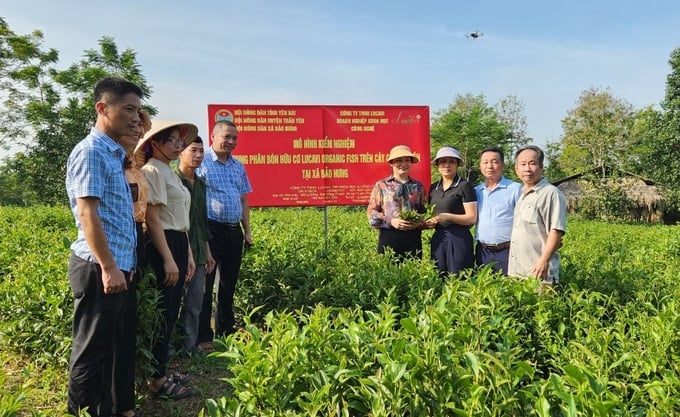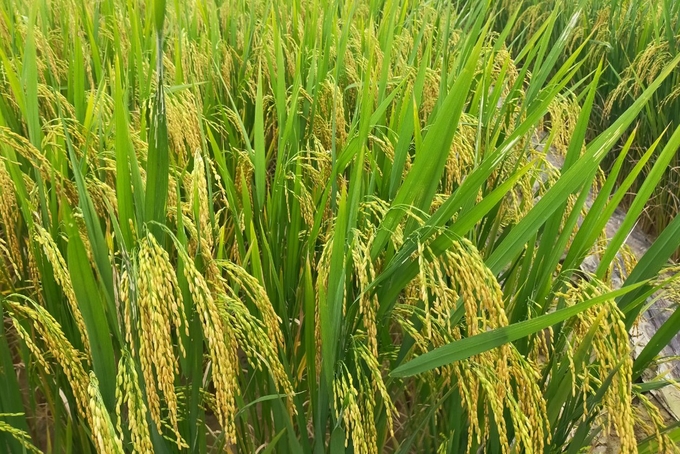November 27, 2025 | 19:09 GMT +7
November 27, 2025 | 19:09 GMT +7
Hotline: 0913.378.918
November 27, 2025 | 19:09 GMT +7
Hotline: 0913.378.918

Field meeting in Bao Thang, Lao Cai, visiting a tea field using Lucavi fertilizer. Photo: Huong Pham.
We want sustainable agriculture, for humanity and all species, today and tomorrow. Ecological agriculture encourages farmers to reuse raw materials on the farm. However, it is not always possible to have a closed, circular farm. Be it tea hills or rice fields, there must still be an input source of organic fertilizer to partially or completely replace chemical fertilizers.
In the case of tea trees in Lao Cai and Yen Bai, after accompanying the staff of Lucavi Co., Ltd. twice to field seminars, I was able to listen to people and officials evaluating the effectiveness of Lucavi fertilizer.
From the farmers’ perspective, their desire is to increase their income in a sustainable way. The tea processing and trading companies want good quality tea which meets the market’s standards and a high rate of finished products.
After three months of testing on tea trees in Bao Thang, Bao Yen, Bat Xat districts (Lao Cai province); Tran Yen, Yen Binh, Van Chan districts and Nghia Lo town (Yen Bai province), tea productivity of areas using Lucavi organic fertilizer increased by 10 - 30% compared to tea areas using chemical fertilizers, depending on the household.
The increase in tea productivity compared to the general model may be partly because of prolonged sunshine and water shortage. Applying Lucavi fertilizer by spraying a 1% solution on the leaves provides water for the plant. Yield increases but fertilizer costs decrease when farmers switch to using Lucavi fertilizer. The time for a crop of machine-cut tea is reduced by 5-7 days/batch. This opens the possibility of one more batch of tea per year.
Speaking at a seminar on October 24, 2023 to evaluate the effectiveness of Lucavi fertilizer in Lao Cai province, Vu, a farmer in Bao Thang district, said he has been using Lucavi fertilizer for 3 ha of tea since August 2023. The batch of tea collected in October 2023 is 11 tons, an increase of 1 ton compared to the tea batch in August which used chemical fertilizers.

Bat Tien tea hill, Bao Hung commune, Tran Yen district, Yen Bai province. Photo: Huong Pham.
Applying Lucavi organic fertilizer comes with two big advantages. The first is labor saving. Applying synthetic NPK fertilizer on 1 ha requires 4 workers, while spraying Lucavi on 1 ha only requires 1 worker. In case the weather is dry for a long time, tea trees can still quickly absorb Lucavi.
As for NPK fertilizer, if the dry weather prolongs, tea trees cannot absorb it and the tea batch will be considered lost. Vu also mentioned that increasing productivity by 10% per batch of tea is not as beneficial as having one more batch of tea per year. With his 3 ha of tea area, increasing 10 - 11 tons of tea per crop means increasing his total income by VND 65 - 71.5 million per year.
The second advantage is quality. To give a basic evaluation, Bat Tien tea grown with Lucavi fertilizer is more fragrant and tastier than Bat Tien tea grown with chemical fertilizers. Analytical results of hand-picked Bat Tien tea in Nghia Lo town, Yen Bai province show that the total Polyphenol content reached 16.5 mg/100 g, higher than the required threshold of 11 mg/100 g. Heavy metals such as lead, arsenic, and cadmium are not detected. The rate of finished products after drying is 10% higher compared to the conventional farming model.
According to Thuan, the owner of a tea processing and trading business, the tea fertilized with Lucavi has shorter stems, wider leaves, larger tea balls, and a lower scrap ratio than tea fertilized with seaweed fish protein (tea fertilized with seaweed fish protein has long stems, small leaves, and high scrap ratio).

GL 25 rice variety fertilized with Lucavi at the Field Crops Research Institute. Photo: Huong Pham.
Besides economic benefits, leaders of Bao Yen district and Chairman of Lao Cai Farmer’s Union also highlighted environmental benefits and soil improvement when using Lucavi organic fertilizer. Using organic fertilizers on tea and crops results in stable income for people in the province, which is consistent with the province's policy of converting toward ecological agriculture and organic agriculture.
Lucavi's effectiveness on food crops is further tested at present. Within the framework of the experiment at the Field Crops Research Institute, Lucavi fertilizer was applied to rice and vegetables. As for the initial result, the plants grew and developed well. The tomato garden planted on September 18 has now bloomed its first flowers, green and healthy. The rice on the field is goldenly ripe and about to be harvested. In Hai Duong province, Lucavi is being tested on carrots in Duc Chinh (Cam Giang) and all kinds of vegetables at Tan Minh Duc Cooperative (Pham Tran commune, Gia Loc district).
Translated by Samuel Pham

(VAN) According to Mr. Vo Minh Thanh, Director of the Tay Ninh Department of Agriculture and Environment, Resolution 57 has created a new development pathway for the locality, shifting from traditional toward modern agriculture.
/2025/11/26/4909-2-154329_878.jpg)
(VAN) Pearl grouper farming in HDPE cages not only delivers economic efficiency but also contributes to protecting the environment, creating jobs, and promoting marine-based experiential tourism.

(VAN) The model of making a living under the forest canopy through the agroforestry system in Van Son commune, Bac Ninh province, is expected to generate an annual income of approximately VND 30 million/ha.

(VAN) Many enterprises in Can Tho are harnessing natural energy and reducing greenhouse gas emissions in their production processes, thereby contributing to the promotion of a sustainable green transition.
/2025/11/24/3536-2-112800_176.jpg)
(VAN) Dong Nai now has tens of thousands of hectares of forests certified for sustainable management, and this area will continue to be expanded in the coming period.

(VAN) Vinh Ha hamlet (Dai Xuyen commune, Hanoi) is shifting away from small-scale farming as households adopt bioscurity into their breeder chicken models.

(VAN) Heavy rains make aquatic species more vulnerable to disease. Proactive water management and high-tech systems help farmers prevent outbreaks and protect yields.